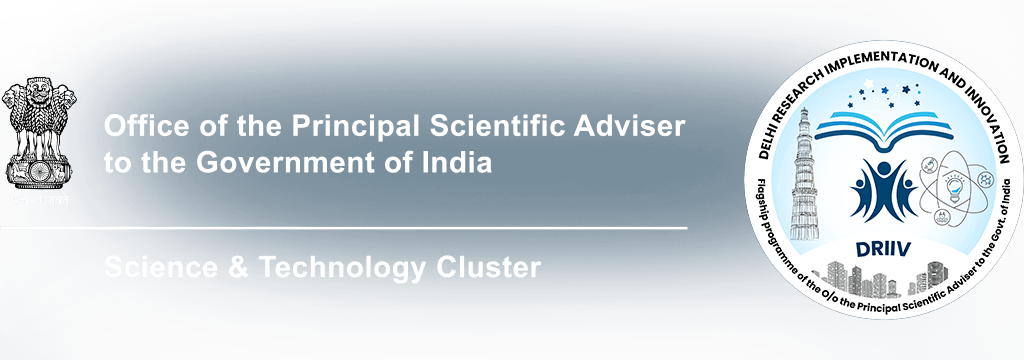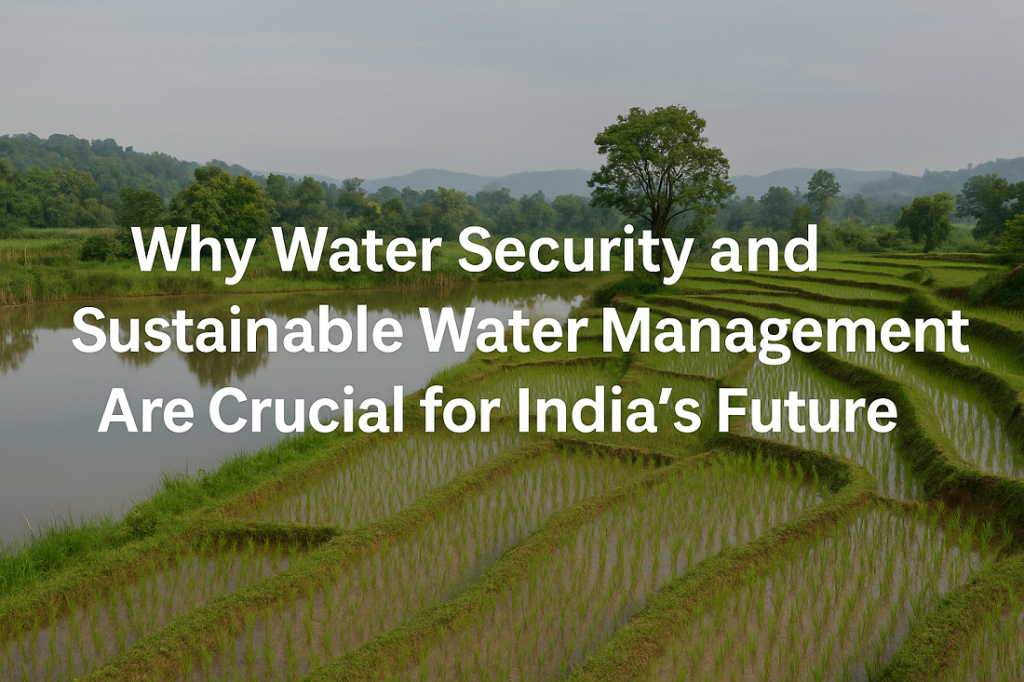Water is life. But in recent years, India has been facing a growing water crisis. With increasing demand, pollution, and climate change, our water sources are under severe stress. To protect this essential resource, sustainable water management is more important than ever.
At DRIIV (Delhi Research Implementation and Innovation), we are committed to developing and implementing smart water solutions. From water conservation practices to innovative technologies like Phycoremediation and Wastewater Treatment Technologies, our goal is to ensure long-term water security in India.
Why Water Security in India Is a Big Concern
Water security means having reliable access to clean water for drinking, agriculture, and industry. Unfortunately, India is currently one of the most water-stressed countries in the world. Here are some of the main challenges:
- Depleting groundwater levels
- Polluted rivers and lakes
- Overuse of water in agriculture
- Climate change causing irregular rainfall
- Poor urban water management
- These issues not only affect people’s health but also harm the economy and the environment.
DRIIV’s Role in Ensuring Water Security in India
DRIIV is working at the intersection of science, technology, and sustainability. Our focus is on solutions that are nature-based, community-friendly, and scientifically effective. Here’s how we contribute to water security in India:
- Supporting scientific research in sustainable water management
- Promoting water conservation through public awareness and smart devices
- Using modern Wastewater Treatment Technologies to recycle and reuse water
- Applying Phycoremediation for cleaning polluted water naturally
- Working with state and central government agencies for policy impact
What Is Sustainable Water Management?
Sustainable water management is the practice of using water in a way that meets current needs without compromising the future. It includes strategies such as:
- Rainwater harvesting
- Efficient irrigation systems (like drip irrigation)
- Reducing water wastage in homes and industries
- Recycling wastewater
- Protecting water bodies from pollution
- These methods help balance water supply and demand and preserve the ecosystem.
Importance of Water Conservation
Water conservation is the effort to use water wisely and avoid waste. In a country like India, where 600 million people face high-to-extreme water stress, saving water is not just a choice—it’s a necessity.
Here are simple ways people and communities can conserve water:
- Fix leaking taps and pipes
- Reuse RO water for cleaning or gardening
- Use water-saving nozzles and flush systems
- Harvest rainwater during monsoons
- Educate children and families about saving water
At DRIIV, we encourage these practices through awareness campaigns and collaborations with schools, RWAs, and NGOs.
Control of Water Pollution: A Growing Need
Contaminated water is a major cause of diseases in India. Control of water pollution is critical for ensuring public health, environmental protection, and sustainable agriculture.
- Sources of water pollution include:
- Untreated sewage from households
- Industrial effluents
- Chemical runoff from farms
- Dumping of plastic and waste into rivers and lakes
To tackle this, DRIIV supports strict monitoring systems and eco-friendly cleaning technologies.
Phycoremediation: A Nature-Based Solution
Phycoremediation is a green technology that uses algae to clean polluted water. It is cost-effective, eco-friendly, and ideal for Indian conditions.
How It Works:
- Special algae are grown in polluted water
- These algae absorb harmful nutrients, heavy metals, and toxins
- Clean water is collected after the algae remove the pollutants
DRIIV has piloted Phycoremediation projects in Delhi NCR, showing great success in reviving dead lakes and reducing chemical loads in industrial discharge.
Wastewater Treatment Technologies: From Waste to Resource
Over 70% of wastewater in India is untreated and ends up polluting rivers and groundwater. To change this, DRIIV is investing in Wastewater Treatment Technologies that convert wastewater into usable water.
Some key technologies include:
- Membrane bioreactors (MBRs): Advanced filtering systems
- Constructed wetlands: Nature-inspired filtration setups
- Decentralized STPs (Sewage Treatment Plants): Useful in rural and semi-urban areas
- Electrocoagulation: Removes suspended solids and metals
These methods are essential for smart cities and rural areas alike. They help in reducing pollution and meeting water demands for non-potable uses like gardening, flushing, and industrial cooling.
DRIIV’s Integrated Approach to Water Security
Our strategy combines technology, community engagement, and partnerships with government and academia. DRIIV’s water-focused programs include:
- Restoration of urban lakes using Phycoremediation
- Pilot plants for Wastewater Treatment in Delhi NCR
- Training programs for water conservation in schools
- Research support for scalable sustainable water management solutions
- Advocacy for control of water pollution in policy circles
Success Stories by DRIIV
1. Revival of Sanjay Lake, Delhi
Using Phycoremediation, DRIIV helped reduce algae blooms and chemical toxins, improving biodiversity and water quality.
2. Decentralized STP in Gurugram
In partnership with local authorities, DRIIV installed a low-energy Wastewater Treatment unit that treats 10,000 liters/day, reused in local parks.
3. Rooftop Rainwater Harvesting
Implemented in several government schools in Delhi, this project promotes water conservation and student awareness.
Benefits of Sustainable Water Management
- When we adopt sustainable water management, we unlock several benefits:
- Safe and clean drinking water for all
- Reduced water bills for households and industries
- Healthier rivers, lakes, and groundwater
- Increased agricultural productivity
- Better climate resilience and biodiversity
Conclusion
India’s journey toward water security must be built on the pillars of sustainability, innovation, and awareness. At DRIIV, we believe that science and technology can be powerful tools in solving our water challenges. From Phycoremediation to Wastewater Treatment Technologies, we are creating real impact.
Through collaborative projects, community action, and research-backed policies, DRIIV is driving the future of sustainable water management in India. Let’s work together to conserve every drop and protect our most precious resource.
FAQs
Q1. What is sustainable water management?
Ans: Sustainable water management means using water in a way that meets current needs while preserving it for the future. It includes practices like water conservation, recycling, and pollution control.
Q2. Why is water conservation important?
Ans: Water conservation helps save water for future use, lowers costs, and reduces the stress on our rivers, lakes, and groundwater. It also plays a big role in fighting climate change.
Q3. How does Phycoremediation help in water treatment?
Ans: Phycoremediation uses algae to naturally clean polluted water by absorbing harmful chemicals and toxins. It’s cost-effective, eco-friendly, and ideal for cleaning lakes, ponds, and industrial water.
Q4. What are Wastewater Treatment Technologies?
Ans: These are systems that clean used water so it can be reused. They include methods like filtration, bioreactors, and natural wetlands. DRIIV supports these technologies to promote recycling and reduce pollution.
Q5. What is water security in India?
Ans: Water security in India means having enough clean water for all purposes—drinking, farming, and industry—while protecting the environment. It also includes making the country resilient against water scarcity and pollution.





Great read! The insights on sustainable water management and the innovative approaches highlighted by DRIIV are truly encouraging. It’s good to see more organizations stepping up in this space—brands like Elysian Industries are also contributing with practical, eco-friendly solutions. Together, efforts like these can really help secure India’s water future.